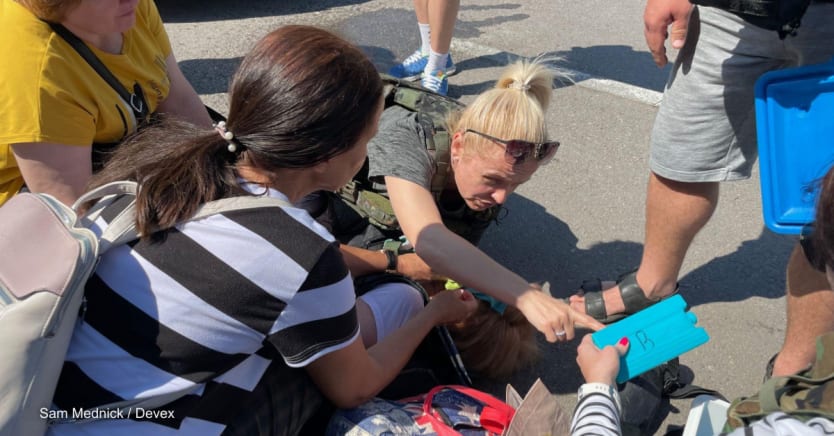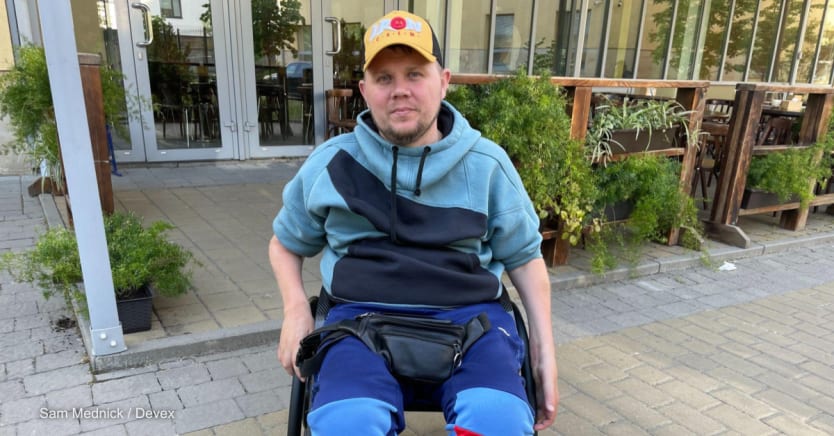
KHARKIV, Ukraine — It took Mariia Chupinina two attempts to evacuate her 12-year-old son Denis from Ukraine’s northern city of Kharkiv after Russia invaded the country in February. Denis has spina bifida, a condition affecting the spine that can manifest in various ways and requires, among other things, a means of special care that puts him at least risk of infection when traveling.
Denis requires a sterile space for his catheter — a tube inserted into the bladder allowing urine to drain — to be changed every two hours, something that can’t be done everywhere, Chupinina said.
But during the chaotic, early days of the war when thousands of people were clamoring into the train station attempting to flee, it was impossible to get an isolated cart, Chupinina said. She tried once in March but people entered the compartment, so the family had to wait until April.
“For the first month, we didn't have any help,” Chupinina, a feisty mother of four who evacuates people from front-line towns when not caring for her children, told Devex during a trip to Kharkiv in June.
“[The government] offered transportation by bus and evacuation to Europe, but they didn't provide special transportation, only offering joint accommodation in churches or school gyms. And this wasn't an option for us,” she said. “If an infection happened it could hurt his kidneys and he could die within 24 hours.”
“Without substantial progress in [disability inclusion], when crises strike, people with disabilities will continue to be excluded from responses and experience significant violations of their rights.”
— Hannah Loryman, head of policy, SightsaversPeople with disabilities in Ukraine have been some of the most affected and most forgotten during the war, locals said. Gaps in information, a disconnect between people with disabilities and organizations that can provide assistance, and a lack of resources, have made it harder for them to seek safety, evacuate their homes, and get medical care in places they’ve been displaced to, according to aid groups and people living with disabilities across the country.
Before the war, some 2.7 million people with disabilities lived in Ukraine. However, that number is likely more than 6 million, according to a report by Inclusive Futures, a disability development inclusion program funded by multiple donors.
People living with disabilities are being left behind due to a lack of accessible transport, such as for those who need wheelchairs or who need to be transferred lying down, with some children in need of a lot of medical support living in basements because they can’t be evacuated at all, the report said.
Fanny Mraz, emergency director for international aid group Humanity & Inclusion, said most of the people who were able to flee the fighting and bombing in Ukraine were those with the means and ability. While the most vulnerable populations — including older persons and people with disabilities — face more difficulties evacuating and accessing humanitarian aid.
“They are left for longer periods with decreasing access to food and medicine, and remain exposed to the dangers of bombing and shelling around them,” she said.
Ukraine’s government has laws in place to support and provide for people with disabilities, but they’re not always adhered to and even less so during times of war, local aid groups said.
Vitaly Pcholkin, head of grUpa aktYvnoi reabilitAtsiyi, or Active Rehabilitation Group, a Ukrainian organization helping people with spinal cord injuries, has been lobbying the government since 2014 — when Russia first invaded, annexing Crimea, and arming Russian-backed separatists in the Donbas region — to create accessible bomb shelters and provide more medical assistance. But he said little has been done.
The Pro read:
How international NGOs are setting up a Ukraine response from scratch
Organizations with little to no experience in Ukraine and Eastern Europe are now scrambling to determine how they'll respond to the crisis.
“A lot of things are being declared but not being done for us. They discuss, write it down, and that's it. A lot of problems aren't solved,” he said, adding that international aid groups could be doing more as well.
Pcholkin and his wife both lost their ability to walk due to spinal cord injuries many years ago, and they were in Bucha town outside the capital, Kyiv, when Russia invaded. Even though the two live mobile, independent lives, when Russian soldiers terrorized the town, the couple sheltered in their apartment for days and were forced to rely on neighbors for food and water, he said.
Compounding the safety concerns of encountering Russian forces in the streets, shell casings from bullets on the road made it hard to move their wheelchairs, and since the city supply of water had been cut off, getting water from the well in a wheelchair was impossible, he said.

Lack of access and information
Chupinina wants the government and aid groups to start providing people with disabilities accessible accommodation, medical assistance, and proper transport, such as special cars that are wheelchair-accessible and medically equipped in places where people need help. At the time, a few Polish and German organizations offered assistance but on the condition that the family made it to the western part of Ukraine — where there was less fighting — because they were too afraid to send people into Kharkiv, which was under heavy shelling, she said.
Local aid groups said there needs to be more communication and collaboration between the government and international organizations, such as the creation of a database listing people with disabilities so they can be identified and helped, specifically in hard-hit, remote areas.
Ukraine’s war highlights the need for governments, donors, and development agencies to embed disability inclusion in their work and build systems to collect better data on disability ahead of crises, while ensuring that assessment tools used when crises happen ask the right questions, including identifying and supporting people with disabilities who are most likely to be excluded, said Hannah Loryman, head of policy at Sightsavers, an international organization focused on avoidable blindness and promoting equality of opportunity for people with disabilities.
“Without substantial progress in this area when crises strike people with disabilities will continue to be excluded from responses and experience significant violations of their rights,” she said. The methods used to undertake assessments often don’t consider disability which results in inaccessible responses, she said.
Ukraine’s Deaf Society said that since the war began, one of the biggest challenges their community faces is lack of information. Before the invasion, six television channels in Ukraine had sign language interpreters. But now — at a time when people need to understand what’s happening the most — only one does, said Iryna Chepchina, president of the organization.
The organization has taken it upon itself to edit President Volodymyr Zelenskyy’s nightly nationwide addresses with sign language interpreters, broadcasting them on chat groups such as Telegram and on social media.
More coverage of the Ukraine crisis:
► NGOs juggle emergency aid, development planning as Ukraine war rages
► Pregnant women struggle to access medical care on Ukraine's front lines
► Ukraine farmers on the front lines of a war fueling global food crisis
It also expanded existing mobile chat groups — from two to eight — to provide more information and consultations for people who are displaced, Chepchina said. Many of the problems arise, however, when there is no phone network — a lifeline for someone living with hearing disabilities — which is the case in many conflict-affected parts of the country. This can make people feel abandoned or faced with dangerous situations, she said.
For example, several families with hearing disabilities accidentally evacuated from Ukraine into Russia because they didn’t have access to information, said Chepchina. “They saw the bus and ran into it. … Only after they looked through the window and started asking people did they understand that they're going to Russia,” she said.
Potential consequences and a piecemeal response
As the war drags on, rights organizations worry that one of the biggest consequences will be that older people and those living with disabilities will be further institutionalized. Before the war, approximately 40,000 older people and people with disabilities lived in institutions across the country, which have been accused by local watchdog groups of abuse and neglect and preventing people from moving freely, said Laura Mills, a researcher with Amnesty International’s crisis response team.
Not only are many institutions not being evacuated and remain in areas that are close to the hostilities or have come under Russian occupation, but the number of people entering them since the invasion appear to be increasing, she said. Older people and people with disabilities have fewer options for housing and less access to information and are seeking safe shelter, she said.
One transit center told Mills in June that out of 900 people that came through, two-thirds were sent to institutions.
“It should not be considered inevitable that older people and people with disabilities get sent to institutions. They have a right to live in the community, they have a right to live their lives like the rest of us.”
But while the government scrambles to address the soaring humanitarian crisis, with nearly 16 million people across the country in need, some international organizations and volunteers are stepping in to help people with disabilities.
DeafBridge, a U.S.-based organization, has trained a team of approximately 10 drivers who have been bringing food to thousands of people and evacuating several hundred people with hearing disabilities around Ukraine since February, said Chris McKenzie, who works with the organization.
Humanity & Inclusion has distributed 236 assistive mobility devices, such as wheelchairs, walkers, crutches, and canes to older people and people with needs in collective health centers, said the group.
But Ukrainians with disabilities said they need more and faster help. During discussions with international aid groups, Pcholkin, head of the local organization helping people with spinal cord injuries, asked for catheters, urinal condoms, and wheelchairs for the toilet, but said it’s taking time to arrive.
He and his wife Ulyana, who also works with the organization, say it’s also important for organizations and the government to stop treating people with disabilities as if they’re all the same. The needs of someone who uses a wheelchair are different from those who can’t see or hear, said Ulyana.
“If you're trying to help everyone, you're not helping anyone,” she said.
Update, July 5, 2022: This article has been updated to clarify that two-thirds of people entering a Ukraine transit center in June were sent to institutions.








